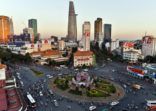Compelling long-term factors such as favorable demographics and low levels of indebtedness are supporting frontier market economic growth.
The MSCI Frontier Market index trades at 9.4 times expected 2015 earnings, which can be compared with 11.1x for emerging markets and 15.2x for developed markets, the asset manager said.
Gross domestic product growth is expected to average around 6% per year over the coming decades in the frontier universe, compared with 5% for emerging economies and less than 2% in the developed world.
“More investors are gradually discovering the opportunities in this diverse universe. The flows to frontier markets and some emerging markets have doubled…over the past three years. That is significant, because FMs still only make up 0.4% of global equities, while EMs constitute approximately 10%,” the asset manager said.
EMs also attractive
East Capital believes there is plenty of upside in both the emerging and frontier universes, which are trading at 10% and 20% below their respective all-time highs.
“Developed markets meanwhile, are trading 25% above their pre-crisis peaks. The valuation differential between emerging and developed markets has widened to almost 40%, which means that EMs are historically very attractive.”
Reform initiatives in a number of key markets in Asia such as China, Indonesia and India, will continue and ideally deepen in 2015.
“These reforms are long overdue. India and Indonesia rank 142 and 114 out of 189 countries in the World Bank’s “Doing Business” ranking. So, the to-do list is painfully long, and these initiatives are neither necessarily easy nor always popular. But we are encouraged by the fact that the drive for reforms is a home-grown realisation about their need, rather than pressure from external forces.”
Support for global equities
Even though the US might start to raise interest rates in 2015, East Capital believes the extraordinarily low global interest rate environment will last for at least another couple of years.
“Firstly, we see no reason that the longer-term trend of falling rates would be broken. Real rates should stay around 1% in the near term and well below 2% in the medium term. Secondly, the global financial crisis is likely to have lasting effects on growth, inflation, regulations and risk appetite [and] that should all contribute to keeping downward pressure on rates.”
The combination of low interest rates and a benign global macro backdrop will be supportive of equities in the year ahead, the fund house said.
According to East Capital, global growth will accelerate in 2015, supported by a low base, low inflation, low rates, lower oil price and $1.5trn more in monetary stimulus.”
“We expect to see a growing differential between the US and UK on the one hand, and the Euro zone and Japan on the other. The former two will start to raise rates in 2015, while we expect the latter to keep rates close to zero for another two years.”
















